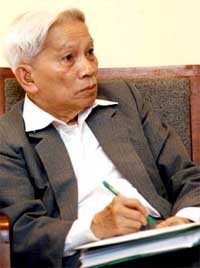Recently, the Ministry of Science and Technology (MoST) has introduced several initiatives to innovate the management of science and technology, particularly the project titled “Policy for the Employment and Utilization of Scientific and Technological Personnel, Phase 2006-2010.”
 | |
Professor Hoàng Tụy. (Photo: Nguyên Vũ) |
As with any new policy during this transitional period, alongside the welcoming opinions, there are also hesitant voices. This is normal and healthy. However, recently on the forum www.most.gov.vn/fa_news, the leadership of the Ministry of Science and Technology reacted unusually strongly to opinions that did not align with theirs.
Expressing his frustration, Professor Hoang Tuy shared his thoughts with VietNamNet regarding current scientific policies. Below is the content of the article.
Developing science, technology, and education has been solemnly stated as the foremost national policy, yet to this day, science and technology have not truly flourished. Is it because the investment is insufficient, because our scientific and technological workforce is too weak, or due to other reasons? This question has been raised many times. Management agencies have also correctly pointed out that the most important reason, if not the main one, is the lack of appropriate policies to motivate and promote the potential of the scientific workforce. Unfortunately, we often only make assessments and then leave them, repeating the same things years later, losing the trust of those deeply committed to the cause. The most recent instance was in 2001, responding to the Prime Minister’s call, many people offered sincere and heartfelt opinions, but like previous instances, all opinions continued to drown in silence, except for the government spending hundreds of millions on agencies to “research mechanisms and policies” to produce more recommendations that would just be stored in an already overflowing drawer of similar documents. I hope that this time, with the pressure of integration, we will work more seriously, honestly, straightforwardly, and meticulously to take practical actions that can bring about real change, restoring the trust that has been awaited for far too long.
“Having substance is what supports morality”
In education, there have been opinions blaming stagnation and chaos on the weakness of the teaching staff. In science, we also often hear criticisms of the scientific workforce. Unfortunately, the desire for fame, opportunism, pursuit of status, envy, and lack of cooperative awareness are quite common in the scientific community. However, I believe we need to reverse the way of thinking to see that a significant part of these weaknesses is merely the inevitable consequence of the inadequacies and decay that have persisted for decades within the management apparatus, which is not only lacking in vision but also in sincerity, and not just at the subordinate level but from the higher echelons.
Whatever one may say, building scientific policy must aim to maximize the scientific capacity of the country, ensuring that the productivity of scientific labor reaches the highest possible level. To achieve this, it is necessary to correctly understand some specific characteristics of this type of labor, the material and spiritual needs that must be met for scientists to work to their fullest potential and contribute effectively.
First and foremost is salary and actual income, as having substance supports morality, as we often say.
Not long ago, when explaining the serious negative issues in the inspection sector that had just been exposed by the press, an official complained that the average salary of an inspection staff member, only about 3 million VND/month, was too low. Strangely enough, at the same time, a good university professor earns only two million VND/month, yet very few leaders express their concern, even though there have been numerous discussions about measures and strategies for developing science and education.
For a long time, scientists have been told: The government can only afford to pay such salaries; you must find ways to cope! And in reality, after several years, they have managed to cope, and now most of them have a decent standard of living, with some even becoming wealthy, earning supplementary monthly incomes reaching tens of millions, not inferior to the upper limit of 1000-2000 USD proposed by the Ministry of Science and Technology for “outstanding” scientists undertaking national tasks!
The only question is where that supplementary income comes from, and what costs are incurred to science, education, and the economy, which the Ministries of Finance, Interior, Education, and Science should consider more responsibly.
With such bizarre salary practices, scientists can only devote a small part of their time and mind to scientific work as per their responsibilities, while the rest must engage in other activities that do not align with their abilities, specialties, and responsibilities but provide most of their income.
Ultimately, the total amount of money that society invests in science, although still small, is not insignificant for us (including the state budget and all other sources). Yet after decades, science remains stunted, with many fields fading away, waiting for a timely revival. I would like to mention a few fundamental scientific disciplines: aside from a few highly qualified professors, most of whom are older, and a handful of talented young individuals still working domestically, what else is left? In five years, the number of older professors will retire entirely, either passing away or becoming too weak, while the talented youth will continue to seek opportunities abroad. Meanwhile, under this management system, very few young talents who have succeeded abroad want to return to work in the country. By then, what will the average age of active scientists in these fields be? 65? 70? Is that not fading away?
But the harm of the wrong salary policy is not just that. If throughout the entire state management system it is a fundamental cause of generating and nurturing rampant corruption, in science, it heavily impacts honesty, leading to deception, producing fabricated reports, or as the newspaper Lao Dong once wrote, “hanging a goat’s head to sell dog meat,” which is not uncommon in the scientific community.
On such a foundation of academic ethics, the number of phony doctors and “academicians” increases each year at a rate unmatched by any other country in the region. One must ask how dangerous the environmental pollution of science is. When dishonesty has infiltrated all scientific and educational activities, it risks becoming a way of life, a profoundly negative cultural trait of society.
Therefore, to achieve true transformation not only in science and technology but also in many other important sectors, the urgent issue, the issue of all issues, is to adequately resolve the salary system for scientists, so that they do not have to earn a living through other jobs but can dedicate their full attention to science. Many officials say that this is not feasible because even raising the salary for each scientist by a few million VND/month exceeds the budget’s capacity. But this is not the case. A research article by Dr. Vu Quang Viet published on VietNamNet not long ago about shocking figures in educational spending has proven the opposite.
Working Conditions and Environment: A Launchpad for Scientists
However, salary, no matter how urgent, is not the entire issue. Experience shows that Kuwait, Brunei, and several other wealthy countries pay very high salaries but their science does not produce significant results. Even within our own country, the “honoring scholars” policy implemented by some localities over the past few years has primarily served more as propaganda rather than yielding any tangible results.
Anyone who ventures into science understands that this is not a profession for becoming rich. A scientific invention often takes time before its benefits are fully realized. Moreover, due to the complex interrelations in today’s science and technology, it is not always easy to evaluate the direct benefits of a particular scientific field or invention to production and life. In contrast, a wise decision made by a good manager can yield billions of dollars in profits for a company in a short time, or a technical innovation can immediately bring in millions of dollars. Therefore, it is understandable that in advanced countries, the salaries of CEOs or chairpersons of large companies often exceed the salaries of renowned scholars by many times. However, this does not mean that society undervalues the contributions of scientists; it merely reflects a specific characteristic of scientific activity.
Scientists need a reasonable salary to ensure a relatively decent standard of living; no one thinks of tens of millions or hundreds of millions as directors of many state enterprises do, whose enormous debts may burden our descendants for many generations to come. Thus, the salary issue for scientists is not too difficult if management agencies genuinely care. What is more challenging, but has received little attention, is that based on adequate salaries, it is also necessary to ensure appropriate working conditions and environment to truly encourage scientific labor.
The passion of scientists, their joy, is in creativity. To maximize that creative potential, they need sufficient salaries to dedicate their entire time to work. But at the same time, to work effectively, they also need a workspace with minimum conveniences, necessary working tools (laboratories, libraries, internet, information, communication), good logistical support (office support), and they need understanding, support, and respect from society and management agencies. They also need friends, colleagues, students, and a democratic, open, and healthy academic atmosphere that encourages equal exchanges of differing opinions, etc. Only under such conditions and in such an environment can we hope for many scientists to work day and night, immerse themselves in the most challenging tasks, as is often seen in major scientific centers around the world.
A scientific policy that does not adequately consider these specific characteristics is likely to make naive and inadequate mistakes. For example, because of a lack of understanding of the complex interplay between science and practice, sometimes there are demands that every scientific project must have immediate applications in life and production, while at other times, they honor arbitrary scientific values, promoting a heavy inclination toward false prestige (which is quite costly, as such false prestige is all bought with foreign currency). Also, due to a lack of attention to the peculiarities of science, on one hand, salaries are undervalued, while on the other hand, allowing the majority of the funding allocated for research projects to be used to supplement income, with the approval and acceptance of projects being very arbitrary and formal, not encouraging talent but only stimulating negative activities. With such a salary, moreover, according to the regulations of the Ministry of Finance, professors do not have private workspaces, and it will take many more years before they can have a workspace of 6 square meters per person, which is less than the space for a low-level administrative deputy currently; a professor’s teaching hour is compensated with 12,000 VND, while a deputy minister, regardless of level, is paid 15,000 VND for a teaching hour. Although these are just nonsensical formal regulations, they clearly reflect the level of respect that state agencies have for science.
With such conditions and environments, no matter how high the salary, it is difficult to attract talented scientists. Therefore, in a meeting last September with the Prime Minister, I stated: scientists need salaries, but what is even more necessary is the conditions and working environment.
Dear Minister of Science and Technology!
It is astonishing that such a simple thing is something that the Minister of Science and Technology does not understand, when he said: Don’t believe scientists who say they don’t need money; they are not sincere (they are dishonest!), and do not genuinely seek opinions; why “despise” money, the money of the people, which is earned through “sweat and tears”! Oh, if only this were the mindset of officials like the Minister, then why would a professor’s salary only be a few million VND/month, and today we would not have to remind each other to remember the people’s money to discuss the proposal for bidding on research projects, where anyone who “criticizes” is surely someone with outdated thinking!
Dear Minister, in economic management, we have (and are) paying a high price for hundreds of state-owned enterprises that operate at a loss of billions, while the directors still receive exorbitant salaries, causing significant harm to society. These enterprises are all established by the State and “entrusted” to directors with full management rights. They are also told: whatever needs to be spent can be spent freely; the State only cares about the results; while projects must be seriously bid on. But do you know what has happened at the oil and gas company, PMU 18, etc.? Can you guarantee that the scientific agencies, which in the past were not lacking in this or that criticism, will be completely clean under your leadership?
With goodwill, I can believe in good promises, but the experience of civilized societies shows that avoiding temptation is safer than confronting it. So should we impose the bureaucratic centralized management style on science?
Ironically, while we need to escape the burden of centralized bureaucratic management, is it possible that only the science management sector will “innovate thinking” by reverting to that cursed dead end?
I have had the opportunity to conduct scientific research and evaluate scientific projects in many countries, and I have not seen any place with a scientific management style like ours. The Ministry of Science and Technology claims to learn from the management practices of the United States and Japan, but I can affirm that our approach is entirely different, and those differences do not stem from any specific characteristics of ours.
Building a road or constructing a factory are complex tasks but have established processes, and the results are predictably certain, thus allowing for bidding to select the cheapest, best, and most profitable options. On the other hand, scientific research is about discovering something new; it is exploratory and sometimes you may not find what you intended but stumble upon something unexpected. The creative process cannot be guaranteed 100% and typically involves many surprising factors. Therefore, nowhere does bidding occur to execute a predetermined scientific project, nor does the government set out hundreds of specific scientific projects for bidding among scientists.
A scientist who wants to innovate needs what is called “academic freedom” within certain limits, and normally only experts in a specific field, who are knowledgeable and have research experience in that area, know what topics should be studied and what resources are needed.
And only peers in their field can evaluate and assess whether a certain project merits research or not. How can any group of people, even if they are all masters, wisely determine 95 specific scientific topics for Vietnamese scientists to bid on funding for research?
Doing so is no different from developing literature, where the government selects 95 novel topics and calls on writers to bid for funding to write novels based on those topics? Is this what they call applying market mechanisms to scientific management?
In other countries, this is not done mechanically. The government only identifies a few priority directions (usually not many) to focus investments on research in those directions, through institutes or universities (public or private) established by the government (like KIST in South Korea) or private organizations.
However, within each priority direction, what topics to research must still be discussed and decided by experts. The government oversees through the products produced, reflected in practical applications or works published in international specialized journals.
For research topics falling under priority directions, the same applies; for topics aimed at addressing pressing issues of individual enterprises, the enterprises handle them themselves, with the cooperation and support of universities and research institutes. Topics that lack clear application addresses or are of a long-term nature related to basic science, requiring significant high-risk investments, are chosen by experts at universities and research institutes, who may then seek funding from the government (or private organizations) through scientific research support funds.
Any topic that seeks funding must submit a proposal to the fund management agency, which organizes a peer review for experts in the same field to provide opinions and based on that decide which topics receive funding.
The financial management rules for projects are very clear: only research projects commissioned by enterprises based on their needs can offer remuneration or bonuses to researchers; other projects generally can only use funds to cover research material needs (purchasing equipment, materials, software, participating in academic conferences, inviting scientists from elsewhere for collaborative research, etc.), without any portion allocated for “remuneration” to increase the personal income of researchers.
Thus, the actual benefits that scientists gain are not from being paid for research (as the research is considered a duty already accounted for in their salary), but from having the conditions to study issues they are passionate about. Each funded project, along with the research results, serves as evidence of scientific activity achievements, recorded in their personal files favoring their professional advancement.
Hence, the motivation for research is not direct income from projects but the long-term and fundamental benefits of research work. When a project is completed, it does not require a formal and often subjective acceptance process as we do; it simply needs to report the results to the funding agency. The evaluation of projects for funding not only considers the project content, its significance, and feasibility but also assesses the recent research achievements of the scientist, where an important part is the successful execution of previously funded projects. If a project is funded but yields few results, it has little hope of receiving future funding. Thus, even without acceptance, researchers are compelled to carry out their work seriously.
Please Do Not Be “Arrogant”
That is the civilized way of management, giving maximum initiative and proactivity to scientists, respecting them to the utmost while ensuring effective investment. It may not be advisable to apply these experiences directly to us, but the fundamental thinking behind them is worth learning, and that is what we wanted to convey when speaking with the Prime Minister. Regardless of agreement or disagreement, the Ministry of Science and Technology should also seriously listen to opinions contrary to theirs. They should not respond to sincere opinions with impolite words; such behavior is inappropriate for the spirit of a democratic and civilized society. And please do not refer to young scientists (under 45, according to the content of the speech) as “young ones”; that is a condescending way of speaking, reflecting a lack of the necessary respect.
Professor Hoang Tuy




















































